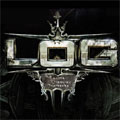
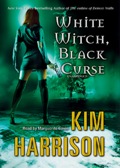 White Witch, Black Curse
White Witch, Black Curse
By Kim Harrison; Read by Marguerite Gavin
15 CDs – Approx. 18 hours [UNABRIDGED]
Publisher: Blackstone Audio
Published: 2009
ISBN: 1433270314
Themes: / Fantasy / Urban Fantasy / demons / vampires / banshees / pixies / memory / detective / romance /
White Witch, Black Curse is the seventh entry in Kim Harrison’s Hollows series, also called the Rachel Morgan series after its protagonist. For the sake of full disclosure, I should state that I haven’t read the previous books in the series. It’s a testament to Harrison’s storytlling that I was still able to jump into the tale with only a minimal perusing of Wikipedia for character background. That said, purists will probably want to start with the first book in the series, Dead Witch Walking, as indeed I intend to do.
Rachel Morgan is a witch who, along with her vampire companion Ivy Tamwood, runs a supernatural investigative agency called Vampiric Charms. She’s the supernatural equivalent of Janet Evanovich’s Stephanie Plum. Modern Cincinatti, in Harrison’s alternate history world, knows of the existence of supernatural beings, collectively dubbed inderlanders. Two federal agencies, the human-staffed Federal Inderlander Bureau and the otherworldly Inderlander Services security agency, maintain relations between the human world and that of the “ever-after” whence all other races came. Vampires, pixies, witches, and other strange beings walk the streets of Cincinatti, and not once in White Witch, Black Curse does their presence pass for comment among the book’s human characters. This marks a refreshing departure from other urban fantasy I’ve read, in which supernatural beings live underground, beyond the awareness of most everyday people.
As the novel opens, Rachel is attempting to solve the murder of her vampire boyfriend Kisten. In theory, this shouldn’t pose a problem, since she was present when the crime took place. But someone, somehow, has wiped her memory of that night’s events, and as she examines the crime scene she experiences only brief flashes of recollection and insight. A recent string of attacks apparently connected to a banshee also calls for her attention. As in most mysteries, these seemingly separate plotlines inevitably intersect at certain points as the novel progresses. The narrative hits several satisfying crescendos and climaxes throughout the book, but on the whole the plot plods along without any clear impetus to drive it forward.
The depth and dynamism of protagonist Rachel Morgan, however, redeems the novel from its mediocre plot. Like many heroines of urban fantasy and paranormal romance, she’s a badass. Unlike many other heroines, her character is balanced by a believable measure of insecurity, self-doubt, and even a hint of self-loathing. As a witch, she’s mostly confident in her magical abilities, but even in this realm she sometimes expresses hesitance. In the sphere of romance, she questions her suitability as a partner, calling herself an “albatross” who brings ruin upon those upon whom she bestows her love. No doubt this has something to do with the death of her former lover Kisten, and events in earlier novels might well bear this belief out as well. She also exhibits the tendency to rush bullheadedly into situations without considering the implications for herself or her circle of friends.
And Rachel is blessed with fast friends, family, and other acquaintances who don’t comfortably fit into a single category. The unlikely highlight among the cast of supporting characters is the pixie Jenx, who often accompanies Rachel on her adventures. The foul-mouthed, irreverent little guy at first appears to serve as nothing more than comic relief, flitting around on a trail of pixie dust and spouting clever obscenities. Yet he stands–flutters?–by her when the going gets tough and many others have abandoned her.
The emotional textures of White Witch, Black Curse further offset the deficit of the novel’s mediocre plot. Rachel’s relationships seldom develop in predictable ways. Her friendships with her partner Ivy, FIB agent Captain Edden, and even the pixie Jenks, all come under occasional strain. The Morgan family dynamics are alo fraught with tension. And then there’s the romance. Rachel seldom devolves into the weak-kneed, crooning damsel of other romance novels. For the most part, she’s remarkably intellectual and circumspect in approaching relationships.
The book’s emotional power even extends to its magic. While not particularly organized or systematic in any “scientific” sense, the magic of the Hollows also hinges on feelings. FIB psychologist Ford has the empathic gift of reading emotional states of those around him. Auras also figure heavily into the plot as an external representation of a character’s internal state. Even a character of sound physical health might be in danger if their aura has been weakened by a recent traumatic experience.
Marguerite Gavin’s performance of White Witch, Black Curse isn’t the best audio rendition of urban fantasy I’ve heard, but it certainly does Harrison’s writing justice. Again, Jenx the pixie is the standout; she lends a nasal, sing-song voice to the spry winged creature which sparkles nearly as much as he does. On the whole, though, the best I can really say about Gavin’s performance is that it’s unobtrusive.
Fans of Kim Harrison’s Hollows series will find White Witch, Black Curse a satisfying continuation to the series. Urban fantasy and paranormal romance enthusiasts will also likely find much to like in Harrison’s unique world. Hardcore fantasy readers, on the other hand, might find themselves put off by a hit-and-miss plot and a lack of any real intellectual depth. Still, the book’s strong characters and emotional power make it a good candidate for some fun summertime reading.
Posted by Seth Wilson

 The now 80 year old Ursula K. Le Guin looks back on her life and career and the Ursula K. Le Guin’s website is hosting the MP3 file made from the March 17th 2009 BBC broadcast interview. Have a listen |MP3|.
The now 80 year old Ursula K. Le Guin looks back on her life and career and the Ursula K. Le Guin’s website is hosting the MP3 file made from the March 17th 2009 BBC broadcast interview. Have a listen |MP3|.

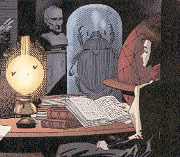 Attentive readers of Alan Moore’s
Attentive readers of Alan Moore’s 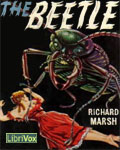

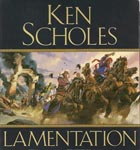
 Lamentation
Lamentation White Witch, Black Curse
White Witch, Black Curse